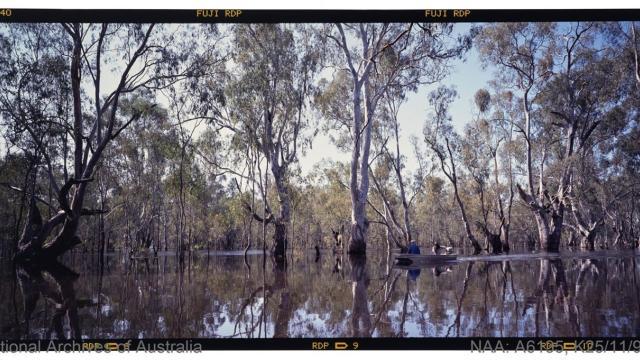
Image credit: National Archives of Australia: A6135, K25/11/91/175
In the early 1980s a new danger faced the Barmah-Millewa Forest, just upstream of Echuca on the border of Victoria and New South Wales. Bordering an 80-kilometre narrow stretch of the Murray River, this forest of river red gums and moira grass had endured decades of unseasonal water flows on account of demands downstream.
With the construction of the Dartmouth Dam, however, a new crisis loomed as water managers and irrigators sought to overcome its “choke” on delivering additional flows down the regulated river. This outlook pitted them against a new coalition of foresters, ecologists and conservationists, who together advocated for the formal recognition of the forest’s ecological, aesthetic, and recreational values. Attending to those values challenged the tradition of hydraulic developmentalism that had steered the management of the Murray since the Great War, which the river’s deteriorating condition served to weaken. Watering the Barmah-Millewa Forest, however, required reconciling these politically ascendant interests with those of the long-established uses further downstream.
The result, this paper shows, was to make what were, at first, ad hoc ‘special water releases to maintain the integrity of the Barmah-Millewa redgum forests and their wildlife’. Such releases would become understood by the early 1990s as an ‘environmental water’ allocation. Drawing on archival materials, this paper considers this episode as representative of a wider turning point in narratives of the Murray, from triumph and development to crisis and decline.
Ruth Morgan is an Associate Professor in the School of History and Director of the Centre for Environmental History at the Australian National University. She is an environmental historian and historian of science with a particular focus on Australia, the British Empire, and the Indian Ocean world, living and working on the unceded lands of the Ngunnawal and Ngambri peoples.
Concerned with questions of climate, water and gender, she is the author of Running Out? Water in Western Australia (UWAP, 2015) and co-author of Cities in a Sunburnt Country: Water and the Making of Urban Australia (CUP, 2022), as well as articles in journals such as Osiris, Pacific Historical Review, and WIREs Climate Change. Her most recent book is Climate Change and International History: Negotiating science, global change, and environmental justice (Bloomsbury, 2024).
Location
Speakers
- Associate Professor Ruth Morgan (Australian National University)
Event Series
Contact
- David Romney Smith